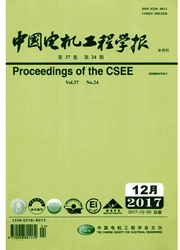

 中文摘要:
中文摘要:
首先论述基于公共节点电压的逆变器并联功率理论的局限性,从新的角度推导基于逆变器输出端电压的并联功率理论。通过线性组合定义“类功率”变量,类有功功率和类无功功率分别只与相位差和幅值差有关,从而提出无互联线并联“类功率”下垂控制策略。推导新型控制策略下的并联系统小信号数学模型,为并联系统的性能分析和参数设计提供理论依据。在2台三相逆变器并联平台上进行实验研究,仿真和实验均表明并联系统具有良好的均流效果。
 英文摘要:
英文摘要:
This paper analyzed the limitation of traditional power theory of parallel operation of inverters based on the voltage of point of common coupling (PCC). An improved power theory of parallel system was deduced based on output terminal voltage of an inverter from a viewpoint of micro-grid autonomy operation. The "quasi power" variables were defined by linear combination and quasi active power and quasi reactive power were only related to the phase and amplitude difference respectively. A quasi-power droop control method for parallel connected inverters was proposed based on the improved power theory. The small-signal mathematical model of the parallel system was derived in a novel droop control scheme, which provided a theoretical basis for the parallel system performance analysis and droop coefficient design. The experiments and simulation were studied in the platform formed by two parallel connected three-phase inverters. The experimental results show that the proposed control strategy is feasible and the good sharing current effect is obtained.
 同期刊论文项目
同期刊论文项目
 同项目期刊论文
同项目期刊论文
 Small-signal modelling and analysis of wind turbine with direct drive permanent magnet synchronous g
Small-signal modelling and analysis of wind turbine with direct drive permanent magnet synchronous g Pulse width modulation AC/DC converters with line current harmonics minimisation and high power fact
Pulse width modulation AC/DC converters with line current harmonics minimisation and high power fact Zero-Voltage-Switching PWM Full-Bridge Converter Employing Auxiliary Transformer to Reset the Clampi
Zero-Voltage-Switching PWM Full-Bridge Converter Employing Auxiliary Transformer to Reset the Clampi Symmetrical short circuit current characteristics of doubly fed induction generator wind turbine wit
Symmetrical short circuit current characteristics of doubly fed induction generator wind turbine wit Full Feedforward of Grid Voltage for Discrete State Feedback Controlled Grid-Connected Inverter With
Full Feedforward of Grid Voltage for Discrete State Feedback Controlled Grid-Connected Inverter With Multiple-Complex Coefficient-Filter-Based Phase-Locked Loop and Synchronization Technique for Three-
Multiple-Complex Coefficient-Filter-Based Phase-Locked Loop and Synchronization Technique for Three- Improved current regulation of three-phase grid-connected voltage-source inverters for distributed g
Improved current regulation of three-phase grid-connected voltage-source inverters for distributed g Flexible Control of Three-Phase Distributed Generation Systems for Voltage Rise Mitigation in Microg
Flexible Control of Three-Phase Distributed Generation Systems for Voltage Rise Mitigation in Microg Voltage stability of medium and low voltage distribution networks with wind generation based on Hilb
Voltage stability of medium and low voltage distribution networks with wind generation based on Hilb 期刊信息
期刊信息
